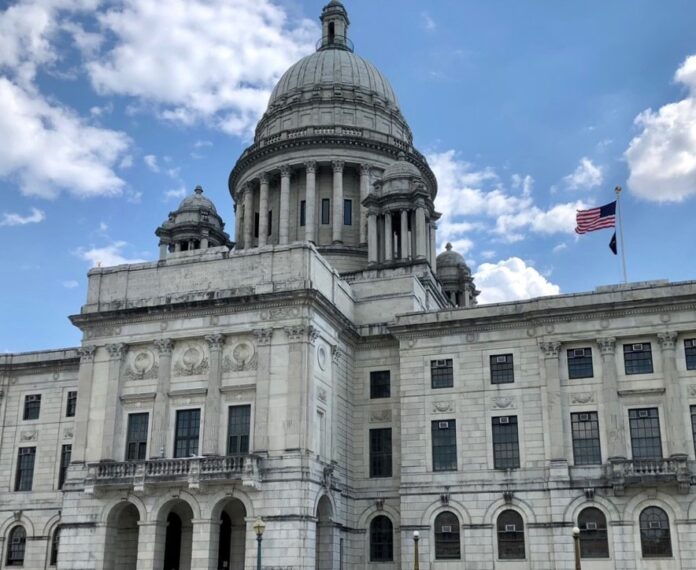
PROVIDENCE – Gov. Daniel J. McKee has proposed cutting the interest rate on delinquent taxes owed to the state of Rhode Island from 18% to 12%, but some groups feel that the cut isn’t steep enough.
David M. Chenevert, executive director of the Rhode Island Manufacturers Association, said the governor’s proposal is aimed at matching Connecticut’s interest rate of 12%, but the national average is much lower at about 5% to 6%.
“Unfortunately, all his proposal does is maintain Rhode Island’s status as highest in the country, co-shared with Connecticut,” said Chenevert, who noted that the federal interest and penalty rate is 2.5%.
Chenevert said that Rep. Robert D. Phillips, D-Cumberland, introduced legislation on Jan. 6 with Bill H-6658 that would reduce the interest rate to 6% per annum.
That is on par with the national average per a Thomson Reuters report, which has Rhode Island and Wisconsin at the top of the list with an 18% interest rate. The majority of states have an interest rate below 10%, with Nevada and Wyoming having no interest rate. North Dakota also has a 12% interest rate.
Alana O’Hare, spokeswoman for the governor, said, “The governor’s primary intent with his [fiscal year 2023] budget proposal is to bring Rhode Island more in line with our neighbors – Connecticut is at 12%. If the General Assembly wants to reduce it further, the governor would review it.”
Larry Berman and Greg Pare, spokesmen for House Speaker K. Joseph Shekarchi and Senate President Dominick J. Ruggerio, respectively, in a joint statement said, “The House and Senate finance committees will hold public hearings on all of the governor’s budget proposals in the coming weeks. The House Finance Committee will schedule a public hearing on legislation introduced by Rep. Phillips. The issue will be carefully reviewed and judged on its merits.”
The governor’s proposal is noted in his proposed fiscal 2023 budget under interest on delinquent payments, in which he calls for the interest rate to be cut to not less than 12% per annum, on and after Jan. 1, 2023. Rhode Island currently charges 18% per year, or 1.5% per month, for the underpayment of taxes.
McKee has touted a business-friendly stance as governor, including a proposal for tax relief in his fiscal 2023 budget. His budget proposal for the second year in a row does not include any major tax increases and calls for reducing the minimum corporate income tax. Rhode Island currently levies a 7% corporate income tax with a $400 minimum tax. McKee’s proposal would reduce the minimum tax to $375.
Chris Parisi, president of the Rhode Island Small Business Coalition, said his organization “is pleased to see the governor heading in the right direction to make Rhode Island a more small-business-friendly state by proposing to lower the tax delinquency interest rate to 12% from the current highest rate in the country of 18%.”
Parisi would like to see the interest rate aligned with the national average at about 6%, which Phillips is proposing in his legislation.
“We applaud and support the governor’s push to lower the rate, and advocate to take this even further with full support of H-6658,” Parisi said.
Melissa Travis, CEO and president of the Rhode Island Society of Certified Public Accountants, said she was pleased to see the governor’s interest in addressing the delinquency tax interest rate. Travis said that when she assumed her role at RISCPA in 2019, it was the first thing the state’s CPAs requested.
“They said get rid of it,” she said. “This is a big, big problem. At an 18% interest rate, we’re the highest in the U.S.”
Travis said the R.I. Division of Taxation can perform a random audit and determine there are misclassified or incorrect items on tax filings, which can also be retroactive to previous years, creating an insurmountable “gotcha” scenario for the business.
“This was through no fault of their own,” she said. “The Division of Taxation then charges that 18% penalty retroactively, and in most cases, it’s many times more than what the original rate would have been. That’s why so many businesses just choose to close. If you get a $160,000 tax bill like that, you’re not staying open; you’re just going to close.”
Travis said the closing of a business has a negative impact on the economy, as the state would have zero revenue from that business and the laid-off employees would have to collect unemployment insurance and other related assistance.
Of concern, Travis said, is the tax penalty for businesses that received Paycheck Protection Program loans greater than $250,000. Those businesses would be faced with a large tax payment if they aren’t prepared to pay their taxes by the March 31 deadline.
“Those businesses have to pay their taxes by March 31, or guess what? They will have an 18% penalty,” she said. “It’s so wrong on so many levels.”
“What we want to see is a reduction of the interest rate,” she added. “Talk about discouraging business growth. Who in the heck is going to move to Rhode Island with an 18% tax penalty interest rate? It’s outrageous.”
Cassius Shuman is a PBN staff writer. Contact him at Shuman@PBN.com. You may also follow him on Twitter @CassiusShuman.













Leave the rate where it is and let them man up pay their taxes on time.
Thanks to Seth, Dan and Gina this State is already in tough enough shape financially. No need to coddle delinquent tax payers.